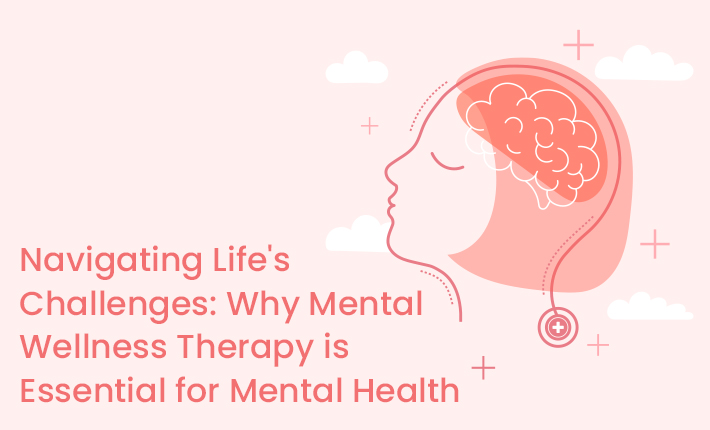In today's fast-paced world, navigating life's challenges can often feel overwhelming. From work stress to relationship difficulties, our mental health is constantly being put to the test. That's why mental wellness therapy has become an essential tool for maintaining and improving our overall mental well-being. Whether you're struggling with anxiety, depression, or simply feeling stuck in a rut, therapy offers a safe space to explore and address these concerns with a trained professional. It provides an opportunity for self-reflection, personal growth, and the development of coping strategies to overcome life's obstacles. Furthermore, therapy is not just for those experiencing severe mental health issues; it is beneficial for anyone looking to enhance their emotional well-being and lead a more fulfilling life. In this article, we will delve into the reasons why mental wellness therapy services is essential, the benefits it offers, and how it can positively impact our daily lives. So, if you're ready to take charge of your mental health and embark on a journey of self-discovery, keep reading to discover why therapy should be an integral part of your overall wellness routine.
The Importance of Mental Wellness Therapy
Mental wellness therapy plays a crucial role in maintaining and improving our mental health. It provides a safe and non-judgmental space where individuals can openly discuss their thoughts, feelings, and concerns. Through therapy, individuals gain a deeper understanding of themselves, their emotions, and the underlying causes of their mental health challenges. This self-awareness is a powerful tool for personal growth and development.
Therapy also offers individuals the opportunity to develop effective coping strategies to navigate life's challenges. A therapist can help clients identify unhelpful thought patterns, behaviors, and beliefs that may be contributing to their mental health issues. By challenging and reframing these patterns, individuals can learn healthier ways of thinking and responding to stressors. This empowers them to better manage their emotions and build resilience in the face of adversity.
Furthermore, mental wellness therapy provides a supportive and empathetic environment where individuals can feel heard and understood. The therapeutic relationship itself can be healing, as it offers validation, compassion, and guidance. Having a trusted professional to confide in can alleviate feelings of loneliness, isolation, and overwhelm. This sense of connection and support is essential for promoting mental well-being and fostering a sense of belonging.
Overall, mental wellness therapy is essential because it promotes self-awareness, provides effective coping strategies, and offers a supportive environment for personal growth and healing.
Common Challenges in Life That May Require Therapy
Life is full of challenges that can impact our mental health. From everyday stressors to major life transitions, these challenges can be overwhelming and affect our overall well-being. Here are some common challenges that may require therapy:
1. Work-related stress: The demands of the modern workplace can be intense, leading to high levels of stress and burnout. Therapy can help individuals manage work-related stress, develop healthy work-life boundaries, and explore career satisfaction.
2. Relationship difficulties: Conflict, communication issues, and relationship breakdowns can have a significant impact on our mental health. Therapy can assist individuals in improving their relationships, resolving conflicts, and developing healthy communication skills.
3. Grief and loss: Coping with the loss of a loved one or experiencing significant life changes can be incredibly challenging. Therapy provides a space for individuals to process their emotions, navigate the grieving process, and find meaning and purpose in their lives.
4. Anxiety and depression: Anxiety and depression are common mental health conditions that can significantly affect our daily functioning. Therapy can help individuals understand the root causes of their anxiety and depression, develop coping mechanisms, and achieve a greater sense of emotional well-being
5. Trauma and PTSD: Traumatic experiences can have long-lasting effects on our mental health. Therapy, particularly trauma-focused therapy, can help individuals heal from past traumas, reduce symptoms of post-traumatic stress disorder (PTSD), and regain a sense of safety and control in their lives.
It's important to note that therapy is not limited to these challenges alone. It can be beneficial for anyone seeking personal growth, self-discovery, or improved emotional well-being.
Understanding Mental Health and Its Impact on Overall Well-being
Mental health refers to a person's emotional, psychological, and social well-being. It affects how we think, feel, and act, and influences how we handle stress, make choices, and form relationships. Just like physical health, mental health is essential for overall well-being and quality of life.
When our mental health is compromised, it can have a significant impact on various aspects of our lives. It can affect our ability to perform well at work, maintain healthy relationships, and engage in activities we once enjoyed. Mental health issues can manifest as emotional distress, cognitive difficulties, behavioral changes, or physical symptoms.
Many factors contribute to the development of mental health issues, including genetics, biology, life experiences, and family history of mental health problems. Additionally, external factors such as stress, trauma, and social isolation can exacerbate existing mental health conditions or trigger new ones.
It's important to recognize that mental health is not a static state; it exists on a continuum. We all have mental health, and it can fluctuate throughout our lives. Seeking therapy is a proactive step towards maintaining and improving our mental well-being, regardless of whether we are currently experiencing severe mental health issues or not.
Different Types of Therapy and Their Benefits
Therapy encompasses a wide range of approaches and techniques, each tailored to address specific mental health concerns. Here are some common types of therapy and their benefits:
1. Cognitive Behavioral Therapy (CBT): CBT focuses on identifying and challenging negative thought patterns and behaviors that contribute to mental health issues. It helps individuals develop healthier ways of thinking and responding to stressors, leading to improved emotional well-being.
2. Psychodynamic Therapy: Psychodynamic therapy explores the unconscious processes and unresolved conflicts that contribute to mental health challenges. By gaining insight into these underlying issues, individuals can make lasting changes and achieve personal growth.
3. Mindfulness-Based Therapy: Mindfulness-based therapies, such as Mindfulness-Based Stress Reduction (MBSR) and Acceptance and Commitment Therapy (ACT), teach individuals to be present in the moment and cultivate non-judgmental awareness. These approaches can help reduce stress, anxiety, and depression, and promote overall well-being.
4. Family Therapy: Family therapy focuses on improving communication and resolving conflicts within families. It can be particularly beneficial for addressing relationship issues, parent-child conflicts, and family dynamics that contribute to mental health challenges.
5. Group Therapy: Group therapy involves a small group of individuals who share similar concerns and come together with a therapist to discuss and support one another. It provides a sense of community, validation, and different perspectives, fostering personal growth and connection.
It's important to note that the effectiveness of therapy depends on various factors, including the individual's willingness to engage in the process, the therapeutic alliance between the client and therapist, and the compatibility of the therapy approach with the individual's needs and preferences.
Conclusion
In conclusion, mental wellness therapy is essential for maintaining and improving our mental health in today's fast-paced world. It provides a safe and supportive environment for individuals to explore their thoughts, feelings, and concerns, develop effective coping strategies, and achieve personal growth and healing. Mental health issues can significantly impact our daily functioning and overall well-being, and seeking therapy is a proactive step towards promoting optimal mental health. With various types of therapy available, individuals can choose an approach that best suits their needs and preferences. By prioritizing our mental wellness and seeking therapy when needed, we can navigate life's challenges with resilience and lead a more fulfilling life.






Leave a reply